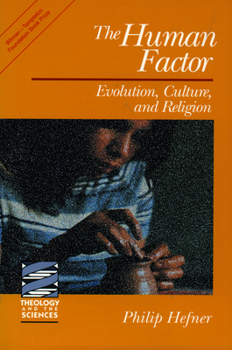The Human Factor
Select Format
Select Condition 
Book Overview
"This amazing book takes into account all of the leading premises of the modern concept of biocultural evolution and builds a bridge to religious theory. Its value lies in its ability to pose the major questions and sketch proposals for dealing with them. To my knowledge it is the first work to make such an attempt."
--Solomon H. Katz
University of Pennsylvania
--Karl E. Peters
Coeditor, Zygon: Journal of Religion and Science
Format:Paperback
Language:English
ISBN:080062579X
ISBN13:9780800625795
Release Date:November 1993
Publisher:Fortress Press
Length:318 Pages
Weight:1.20 lbs.
Dimensions:0.9" x 6.0" x 9.0"
Related Subjects
Christian Books & Bibles Religion Religion & Spirituality Religious Studies TheologyCustomer Reviews
2 ratings
Necessary book!
Published by Thriftbooks.com User , 20 years ago
It's too bad that at the time I write this review, Hefner's book is out of print. It is a book that should be read by everyone interested in the dynamic relationship between culture and nature - because that is what Hefner's focus is. In this book, Hefner develops his well-known model of human beings as "created co-creators". Though it is characterized by a typically American optimist attitude, Hefner's book is a fruitful attempt to develop a model in which the technological civilization in which we are now living has to overcome the alienation from nature through a reorganization of consciousness. Instead of separating human culture and nature, Hefner wants to bring them back together through a theological rethinking of what it means to be human. This book is not only of interest to theologians or people interested in the interaction of religion and science, but to everyone who wants to reflect on the question what it means to be human in an age of technology.
Science, Theology and Ethics
Published by Thriftbooks.com User , 21 years ago
Hefner's book is an enterprise in making sense of Christian faith in the context of contemporary scientific knowledge and experience. The author aims at a theological anthropology in the light of the natural sciences. In other words, the book wrestles with the question of who human beings are, what they are, and what they are alive for. Hefner positions himself in what he calls the Hebrew/Jewish/Christian stream. The book's arguments are set before the reader in clear fashion. First, he argues that humans are thoroughly natural creatures having emerged from natural evolutionary processes. These processes have produced culture, and humans are members of culture. Second, the planet is in critical condition and it is the challenge of humans to fashion a viable system of cultural information to fulfill their human nature in this ecosystem. Third, myth and ritual, which emerged somewhere between 100 thousand and 20 thousand years ago, provide information to enhance human life in its present threatened conditions. And finally, we are required today to use science and myth to offer proposals for the direction, meaning and purposes of humanity. Hefner's influential theory of humans as "co-creators" is developed fully in this book. The theory of the co-creator involves three aspects. One, "the human being is created by God to be a co-creator in the creation that God has brought into being and for which God has purposes. Two, the conditioning matrix that has produced the human being--the evolutionary process -- is God's process of bringing into being a creature who represents the creation's zone of a new stage of freedom and who, therefore, is crucial for the emergence of a free creation. Three, the freedom that marks the created co-creator and its culture is an instrumentality of God for enabling the creation (consisting of the evolutionary past of genetic and cultural inheritance as well as contemporary ecosystem) to participate in the intentional fulfillment of God's purposes" (32). The author's proposals related to love, altruism and morality come near the end of the book. Hefner is well aware of and critiques various theories related to altruism proposed by philosophers and scientists. He suggests that "our moral action of love for God and neighbor is our way of living in harmony with the way things really are" (191). In other words, the love that God has for us and our love for God and neighbor places us in the all-encompassing symbolic universe that drives the Christian tradition. The Christian myth entails that "all morality presupposes and is response to the prior love of God for us, a love that seeks our well-being and the fulfillment of that for which we have been created" (194). Nature itself is an ambiance in which humans belong and that enables humans to fulfill the purpose for which they were brought into being. "The central reality that undergirds all concrete experience and to which we continually seek to adapt," c





